|
|
|
Sort Order |
|
|
|
Items / Page
|
|
|
|
|
|
|
| Srl | Item |
| 1 |
ID:
157728
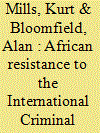

|
|
|
|
|
| Summary/Abstract |
The creation of the International Criminal Court (ICC) in 1998 marked a substantial advance in the effort to ensure all perpetrators of mass atrocities can be brought to justice. Yet significant resistance to the anti-impunity norm, and the ICC as the implementing institution, has arisen in Africa. The ICC has primarily operated in Africa, and since it sought to indict the sitting Sudanese President Omar al-Bashir in 2008 resistance from both individual African states and the African Union has increased substantially. We draw on the concept of ‘norm antipreneurs’, and the broader norm dynamics literature, to analyse how resistance has developed and manifested itself, as well as the potential effects of this resistance on the anti-impunity norm. We conclude that the antipreneur concept helped us structure and organise analysis of the case – suggesting it could be usefully deployed in other similar cases – but that this case also suggests that antipreneurs do not always enjoy substantial defensive advantages. We also conclude that African resistance to the ICC has substantially stalled the advance of the anti-impunity norm, a finding that has significant implications for the wider effort to reduce mass atrocity crimes in the contemporary era.
|
|
|
|
|
|
|
|
|
|
|
|
|
|
|
|
| 2 |
ID:
162477


|
|
|
|
|
| Summary/Abstract |
Given the history of the International Criminal Court in Africa, the relationship between African states and the Court is particularly significant to its legitimacy. If the power of the Court is grounded in international political support and the perception that it transcends international and national politics to deny impunity for ‘atrocity’ crimes, the Court's perceived legitimacy and normative legitimacy are so intertwined that charges of illegitimacy from significant regional stakeholders hold particular weight. More importantly, criticisms voiced by African actors point to a valid challenge to the Court's legitimate moral standing as an arbiter of global justice: the international power imbalance that seems to be becoming more entrenched and apparent in the Court's work. Tactics adopted by some African leaders of prioritising the issue of heads-of-state immunity, however, minimise the broader issue of power differentials and reduce the chance that African states will find allies in their cause to challenge the Court's operations.
|
|
|
|
|
|
|
|
|
|
|
|
|
|
|
|
| 3 |
ID:
176210
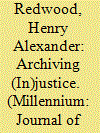

|
|
|
|
|
| Summary/Abstract |
This article explores the role that archives play in the constitution and governance of the international community. First, drawing on post-colonial scholarship, it develops a framework to explicate the link between archive and community, centring on questions of voice, identity and responsibility. It then examines how the archive can be analysed, pointing additionally to the importance of the archive’s materiality. Second, these ideas are explored through a reading of the International Criminal Tribunal for Rwanda’s (ICTR) archive, which helped rebuild the international community in the wake of its failure to prevent the Rwandan genocide. By providing a detailed reading of the ICTR’s records, and drawing on the framework established in the first section, the article shows that the archive constructed a liberal, patriarchal and colonial understanding of the international community.
|
|
|
|
|
|
|
|
|
|
|
|
|
|
|
|
| 4 |
ID:
177850
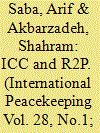

|
|
|
|
|
| Summary/Abstract |
The ICC and R2P share the goal of ending atrocity crimes. Nonetheless, they operate quite differently. Recently, there has been increasing support for bringing the ICC within the R2P toolkits, hoping they will complement each other to achieve their shared goal. The Security Council put this idea into practice to deal with the 2011 crisis in Libya. However, the invocation of ICC against the backdrop of an evolving military intervention under the R2P mandate highlighted significant risks to its integrity and legitimacy. This paper argues that the invocation of ICC to constrain violence and to hold accountable the Libyan regime for atrocity crimes eventually resulted in legitimizing military intervention and regime change under the R2P mandate. The Libya case suggests that neither the push for complementarity nor a full separation between the ICC and R2P benefits the ICC. There needs to be a balance between full engagement and separation. Such an alternative rests on the ICC avoiding entanglement with R2P’s military mandate, while maintaining close interaction with its non-military components through the Security Council. Lastly, the paper also points to areas in which the Council could play a more constructive role in cementing greater cooperation between R2P and the ICC.
|
|
|
|
|
|
|
|
|
|
|
|
|
|
|
|
| 5 |
ID:
184662
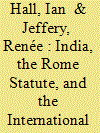

|
|
|
|
|
| Summary/Abstract |
Despite its long-standing rhetorical support for an international criminal justice regime, India continues to resist signing the 1998 Rome Statute that created the International Criminal Court. This article explores the reasons for this reluctance. It observes that during the negotiations that led to the Rome Statute, India voiced multiple objections to the design of the ICC, to how it was to function, and to the crimes that it was to address. It argues that analyzing the negotiating strategy India employed during those talks allows us to discern which reasons mattered more to New Delhi and what accounts for India’s ongoing refusal to sign the Rome Statute.
|
|
|
|
|
|
|
|
|
|
|
|
|
|
|
|
| 6 |
ID:
158327


|
|
|
|
|
| Summary/Abstract |
This article analyses how the International Criminal Court dealt, in the case of Al-Mahdi, with the crime of intentional attacks directed against protected cultural heritage sites. The case is discussed in the context of the previous experience and jurisprudence of other international criminal tribunals in prosecuting and punishing the perpetrators of cultural heritage crimes. In this respect, the article examines the complementary function of international criminal justice in relation to the shortcomings of national criminal jurisdictions. It also deals with a set of fundamental issues emerging at the junction of the international protection of cultural heritage and individual criminal responsibility, being the gravity of international crimes; cultural genocide as affecting the identity of a group; and the primary obligation of States to exercise criminal jurisdiction over individuals. The core aim of the article is thus to critically analyse the extent to which the ICC judgment in Al-Mahdi may be seen as a breakthrough towards a more efficient international mechanism for counteracting impunity in crimes against cultural heritage.
|
|
|
|
|
|
|
|
|
|
|
|
|
|
|
|
| 7 |
ID:
110905


|
|
|
|
|
| Publication |
2012.
|
| Summary/Abstract |
International criminal justice is a relatively new field of international law. For this reason alone, it excites curiosity. Minute traces of the new development are to be found in the years preceding the Treaty of Versailles. The provisions of that treaty relating to the subject were less than credibly performed. The International Military Tribunal caught the attention of jurists for a while, but thereafter the matter went in practice into a 50-year somnolence until re-awakened in 1993 by the establishment of the International Criminal Tribunal for the former Yugoslavia. The reason why an interest has to be taken in the subject exceeds the novelty of the field: it has to do with substance. The traditional immunity of presidents or heads of government, prime ministers and other functionaries acting in an official capacity no longer prevails; the doctrine of superior orders is inapplicable except, where appropriate, as in mitigation; and the gap between international armed conflict and internal armed conflict has closed. More generally, the bridge has been crossed between the responsibility of the State and the criminal liability of the individual. As a result, the traditional impunity of actors for the State has practically gone. Judge Wang Tieya helped in this process and merits grateful thanks.
|
|
|
|
|
|
|
|
|
|
|
|
|
|
|
|
| 8 |
ID:
093000
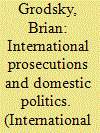

|
|
|
|
|
| Publication |
2009.
|
| Summary/Abstract |
Since the end of the Cold War, increased efforts at international criminal justice have begun to transform transitional justice for the worst cases of atrocities from a predominantly domestic affair to an international one. I examine side-effects of international pressure for criminal justice, arguing that political elites struggling to balance conflicting international and domestic demands may launch "compromise justice" policies designed to satisfy both, but which in effect weaken mechanisms that transitional justice scholars posit make postconflict reconciliation most likely. I apply this argument to the former Yugoslavia, examining Serbian and Croatian truth commissions as a form of "compromise justice.
|
|
|
|
|
|
|
|
|
|
|
|
|
|
|
|
| 9 |
ID:
099860


|
|
|
|
|
| Publication |
2010.
|
| Summary/Abstract |
The International Criminal Court is a new mechanism for the global governance of human rights that enjoys broad support from a large number of states. The United States expressed its hostile opposition especially in the early years, claiming that the ICC was harmful to US national interests. This attitude toward the court changed over the years, and a more pragmatic approach toward the ICC is now discernible. The United States had to acknowledge that actions taken in opposition to the ICC began to be harmful to its own national interests and it also realized the national interest utility the court has despite the deep-seated opposition to the concept of supranational sovereignty. This article looks at the reasons for opposition by the United States, its initial hostile position, and changes in the US approach toward the ICC.
|
|
|
|
|
|
|
|
|
|
|
|
|
|
|
|
| 10 |
ID:
147701


|
|
|
|
|
| Summary/Abstract |
This article situates the emergence of the Responsibility to Protect (R2P) concept, later accepted by many as a principle, in the wider flow of events following on the end of the Cold War. Among the hallmarks of change in the United Nations (UN) Security Council as of the early 1990s, in stark contrast to the Council’s preoccupations during its first four decades of activity, was its growing attention to humanitarian considerations relating to conflict, its new willingness to tackle conflicts (mainly internal ones) it might have avoided earlier, and its willingness to experiment with new approaches to resolving them. Just as worries over terrorism and the threat of weapons of mass destruction were to become dominant themes in its work, the humanitarian imperative also incrementally wove itself into the fabric of the Council’s decision-making. It is against this wider backdrop and that of several spectacular UN failures to prevent genocide and other mass humanitarian distress that UN Secretary-General (UNSG) Kofi Annan was impelled as of 1999 to look beyond existing international law and practice for a new normative framework, that while formally respecting the sovereignty of states nevertheless elevated humanitarian concerns and action to the level of an international responsibility to prevent the worst outcomes. Today R2P finds itself competing with other legal and diplomatic principles, but it remains a potent platform for advocacy and, at times, for action by the UN.
|
|
|
|
|
|
|
|
|
|
|
|
|
|
|
|
| 11 |
ID:
107067


|
|
|
|
|
| Publication |
2011.
|
| Summary/Abstract |
The International Military Tribunal for the Far East (1946-1948) or Tokyo IMT is overlooked for its contributions to modern international criminal justice. Convened to hold Japanese leaders accountable for conspiring to commit aggression, crimes against peace, crimes against humanity, and war crimes during the Second World War, the IMTFE was both a groundbreaking judicial undertaking and a pioneering multilateral institution. This distinction makes it a unique vehicle for exploring the fundamental challenges of both international justice and organisation. Institutions like the IMTFE are usually viewed through broad geopolitical, legal, and ideological lenses. Although important, these approaches miss a singularly important dimension of multilateralism: the human contingencies that impact international bodies. Using unique participant sources, this article presents an intimate "trial's-eye-view" of how working at the IMTFE affected the emotions, psychology, and temperament of its personnel. Participant responses on these very personal levels had profound consequences on the tribunal's proceedings, findings, and legacy. Other factors shaped justice in Tokyo, but the responses identified here were common, and their impact significant. Ultimately, this paper argues that people and their experiences-as much as anything-produced the outcome of justice in Tokyo.
|
|
|
|
|
|
|
|
|
|
|
|
|
|
|
|
| 12 |
ID:
165920
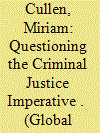

|
|
|
|
|
| Summary/Abstract |
The Security Council’s structure as a small but powerful executive, combined with its primary responsibility for international peace and security, leads to a presumption against the application of ordinary standards of procedural fairness. At the same time, explicit provisions of the UN Charter and its own rules of procedure indicate that some balance was to be struck. This article questions whether the attainment of international criminal jurisdiction through Security Council decision-making really outweighs the need to ensure procedural integrity in every step of the process. It posits that a lack of procedural fairness in the Council’s methods of work at least undermines the justice imperative that the Council so espouses and at most violates an ancillary legal obligation.
|
|
|
|
|
|
|
|
|
|
|
|
|
|
|
|
| 13 |
ID:
046262


|
|
|
|
|
| Publication |
London, Lynne Rienner Publishers, 2002.
|
| Description |
viii, 335p.
|
| Standard Number |
1588260704
|
|
|
|
|
|
|
|
|
|
|
|
Copies: C:1/I:0,R:0,Q:0
Circulation
| Accession# | Call# | Current Location | Status | Policy | Location |
| 046284 | 341.23/WHI 046284 | Main | On Shelf | General | |
|
|
|
|
| 14 |
ID:
108250
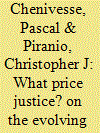

|
|
|
|
|
| Publication |
2011.
|
| Summary/Abstract |
Following the Second World War, evolving notions of human rights have been met by evolving understandings of rights that should be afforded the accused in judicial processes. The following considers this evolution in proceedings stretching from Nuremberg to The Hague, as a struggle between forces that have given birth to each successive stage in international criminal justice, as well as of forces that have grounded rights of defence as advancing the cause of justice itself. Indeed, while notions of 'right to fair trial' and 'equality of arms' suffer from conflicted understandings over what consists in justice, and from conflicting interests over what powers should be afforded parties in the judicial process, this article suggests that the primacy afforded rights of the accused reflects, most evidently in the International Criminal Court, the growing acceptance of liberal democratic notions that justice is most clearly founded not on the treatment of victims, but on the treatment afforded those who mistreat others.
|
|
|
|
|
|
|
|
|
|
|
|
|
|
|
|
|
|
|
|
|